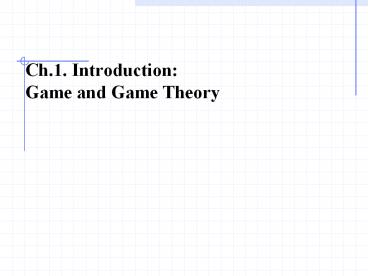Ch.1. Introduction: Game and Game Theory
1 / 16
Title:
Ch.1. Introduction: Game and Game Theory
Description:
1.2 Classifications of games and the outline of this lecture. 1) cooperative vs. ... oligopoly, trading process(auctions, bargaining), employment and promotion, ... –
Number of Views:161
Avg rating:3.0/5.0
Title: Ch.1. Introduction: Game and Game Theory
1
Ch.1. Introduction Game and Game Theory
2
LIST
- 1.1 What is a game theory?
- 1) game theory and game
- 2) what is a game?
- 3) Game theory
- 1.2 Classifications of games and the outline of
this lecture - 1) cooperative vs. non-cooperative game
- 2) perfect vs. imperfect game
- 3) complete vs. incomplete game
- 1.3 Evaluation of Game Theory
- 1) Rubinstein
- 2) Nashs Nash Equilibrium
- 3) Nobel Prize in economics, 1994
- 4) Applications
3
1.1 What Is a Game Theory?
- 1) game and game theory
- Game theory emanates from studies of amusement
games such as chess or poker.The first theorem
in game theory is Zermelos theorem on
Chess(1913). - However, game theory is no longer concerned with
amusement games.
4
Zermelos Theorem
- asserts that in chess either white can force a
win, or black can force a win, or both sides can
force at least a draw.
5
2) What is a game?
- a) A game in everyday life
- a universal form of recreation generally
including any activity engaged in for diversion
or amusement and often establishing a situation
that involves a contest or rivalry
(http//www.britannica.com/) - Ex) board games, card games, video games,
field games, etc. - b) a game in game theory
- any rule-governed situation with well-defined
outcome, characterized by strategic
interdependence.(Gardner, p.4)
6
c) comparison.
- Games in game theory
- exclude non-interactive games
- athletic sport(100m, ..., marathon, race,
etc), golf, - -- no interaction except for
psychological effects - (2) include game-like socio-economic situations
.(main object of study) - oligopoly, trading process(auctions,
bargaining), employment and promotion, valuation
of firm values, international trade policy,
macroeconomic policy decision,voting, etc -gt
economics, business, sociology, politics,
biology,
7
3) game theory
- It studies multiperson, or interdependent,
decision problems. - It can be defined as the study of mathematical
models of conflict and cooperation between
intelligent rational decision-makers. - --gt more descriptively accurate names "Conflict
analysis" or "interactive decision theory"
(R.B.Myerson, Game Theory analysis of conflict,
Harvard Univ. Press, 1991, p.1)
8
1.2 Classifications of games and the outline of
this lecture
- 1) cooperative vs. non-cooperative game
- A game is non-cooperative if players can
not make binding commitments(or agreements), and
cooperative otherwise, irrespective of the
possibility of communications. - Unit of analysis is an individual player
in non-cooperative games, and a group(coalition)
in cooperative games. - We do not deal with cooperative games.
9
- 2) perfect information vs. imperfect information
game - Perfect information at each move in the game,
the player with the move knows the full history
of the play of the game thus far.(p.121) - ex) chess, football, English auction
- Sequential and open moves -gt dynamic games
games with more than 2 stages - Imperfect information game a player does not
know what others did. - ex) sealed bid auction, game of rock,
paper, scissors. - Simultaneous and secret moves -gt static
games games with a single stage
10
- 3) complete information vs. incomplete
information game - Incomplete information at least one player is
uncertain about another players payoff function.
Asymmetric or private information - Ex) Firms MC and workers ability may be
private information.
11
4) Contents of our textbook
12
1.3 Evaluation of Game Theory
- 1) Rubinstein
- ("Introduction" in Game theory in
Economics, eds by A. Rubinstein, 1990, p.xi) - 1950s-- era of general equilibrium
- 1960s-- era of growth
- 1970sera of economics of information
- 1980s era of game theory
13
2) Nashs Nash Equilibrium
- ( R.B. Myerson, "Nash Equilibrium and the History
of Economic Theory," Journal of Economic
Literature, 37(3), September 1997, 1067-1082) - Nash's theory of noncooperative games should now
be recognized as one of the outstanding
intellectual advances of the twentieth century,
comparable to the discovery of the DNA double
helix in the biological sciences.(p.1067) - Why? It provides a general analytical framework
(methodology) for extending rational-choice
analysis to non-market applications. (p.1069) - So, economics could change from
(marginalist era) social science concerned with
the production - and allocation of material
goods - to (today) the analysis of incentives in
all social institutions.
14
? Nashs papers
- Equilibrium Points in n-Person Games,
Procedings of National Academy Sciences, 1950,
48-49 (Two pages) - Noncooperative games, The Annals of
Mathematics, 1951, 289- 295(Ph.D Thesis, 1950) - Sad life Nash(1928-) Ph.D in Math, Princeton
Univ.(1950), MIT 1951-59, 1959-1990 paranoid
schizophrenic - Sylvia Nasar, A Beautiful Minda biography of
John Forbes Nash, Jr, 1998 (Film, 2001)
15
3) Nobel Prize in Economics in 1994
- Three Game theorists, Nash, Harsanyi, and Selten
won the Nobel Memorial Prize in Economic Sciences
in 1994 for their pioneering analysis of
equilibria in the theory of non-cooperative
games. Press Release
16
4) applications
- Auction analysis should certainly be counted as
one of the most important applications of game
theory, and the FCC auctions gave a practical
demonstration of the power of auction analysis.
(Myerson, 1997, p.1078-1079) - See, Paul Milgrom, Auction Theory for
Privatization, - Cambridge, 2000,
- FCC, Wireless Telecommunications Bureau
Auctions FCC Home Page - "the greatest auction in history,"
raising over 7 billion - for the U.S. government.































